

Stress affects 92% of working Singaporeans. A whopping 92% of working Singaporeans are stressed – and women are prioritising families over themselves, study finds, Business Insider - Business Insider Singapore. Pexels If you’re feeling stressed at work, you’re not alone.
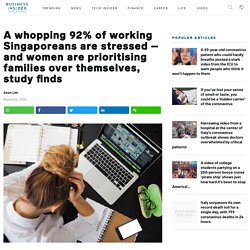
A vast majority of working Singaporeans are under stress, and women in particular feel that it’s less manageable, a survey has found. In the 2019 Cigna 360 Well-Being Survey, a whopping 92 per cent of working Singaporeans report feeling stressed, higher than the global average of 84 per cent. Of this, 13 per cent say their stress is unmanageable, which is on par with the global average, according to the study which surveyed a total of 13,200 online interviews in 23 markets, including 502 residents in Singapore. And stress doesn’t go undetected in the workplace. Read also: 6 in 10 Singaporeans admit that they don’t leave work on time just to ‘show face’ Are you Stressed? Stress - What is Stress - Why Is Stress Bad - What Causes Stress - How Stress Works.
Emotional changes. Behavioural changes. Physical changes. The Main Causes of Stress. Stress is normal and, to some extent, a necessary part of life.
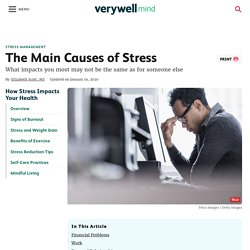
Despite it being something everyone experiences, what causes stress can differ from person to person. For instance, one person may become angry and overwhelmed by a serious traffic jam, while another might turn up their music and consider it a mild inconvenience. A fight with a friend might follow one person around for the rest of the day, while another might easily shrug it off. What's causing you stress may already be something you're abundantly aware of. But given the importance of keeping stress in check when it comes to mitigating the effects it can have on your physical and mental health, it's worth opening yourself up to the possibility that other factors may be at play, too. Financial Problems According to the American Psychological Association (APA), money is the top cause of stress in the United States.
The Rise Of Workplace Stress In Singapore. Are you part of the 92%? Singapore's Stress Report. Posted at 05:39h in Blog by Wendy Makundi If you’re living in Singapore and have trouble sleeping at night, chances are, you’re part of these statistics.

Let’s check out our stress report. Stress Report According to a Cigna 360 Well-Being Survey done in 2019, a staggering 92 per cent of working Singaporeans report feeling stressed. 8 per cent higher than the global average at 84 per cent. Numerous reports have shown that stress in Singaporeans predominately culminates in the workplace. Wellness Support One encouraging fact is that companies in Singapore have been taking steps to combat this problem by introducing wellness programmes; with many offering after-work activities that cater to employees physical well-being.
But still, it seems like there is more that could be done. Harvard Business Review wrote: “Fewer jobs pose everyday threats to workers’ physical health and safety, but chronic stress is a specter that haunts us all. Singapore spends $3.1 billion on stress-related illnesses annually: Study, Health News. SINGAPORE - A study has found that Singapore spends about US$2.3 billion (S$3.1 billion), or 18 per cent, of its total healthcare expenditure on stress-related illnesses annually.
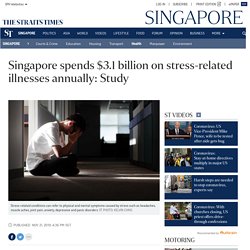
This put the nation's proportion of expenditure on stress-related illnesses second-highest out of the nine regions studied in the report, coming just 0.8 per cent behind Australia's 18.8 per cent. The other seven regions were Hong Kong, South Korea, Taiwan, Thailand, United Arab Emirates, the United Kingdom and the United States. The report, which was produced by healthcare consultancy firm Asia Care Group on behalf of health insurance and services company Cigna, was published on Thursday (Nov 21).
Coping strategies – CESH / CSHS. Stress has a major impact on mental and physical health.
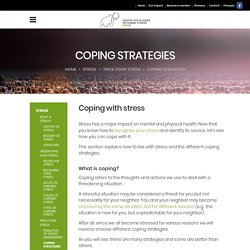
Now that you know how to recognize your stress and identify its source, let’s see how you can cope with it. This section explains how to live with stress and the different coping strategies. What is coping? Coping refers to the thoughts and actions we use to deal with a threatening situation. A stressful situation may be considered a threat for you but not necessarily for your neighbor. After all, since we all become stressed for various reasons we will need to choose different coping strategies. As you will see, there are many strategies and some are better than others. Two different coping strategies Problem-focused strategy This strategy relies on using active ways to directly tackle the situation that caused the stress: you must concentrate on the problem.
Analyze the situation e.g. Emotion-focused strategy Emotion-focused coping strategies are used to handle feelings of distress, rather than the actual problem situation. 17 Highly Effective Stress Relievers. From minor challenges to major crises, stress is part of life.
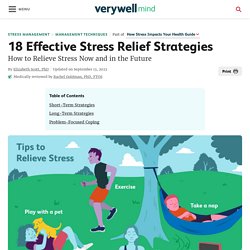
And while you can't always control your circumstances, you can control how you respond to them. When stress becomes overwhelming, or it's chronic, it can take a toll on your well-being. That's why it's important to have effective stress relievers that can calm your mind and your body. 5 problem-solving skills to manage workplace stress.